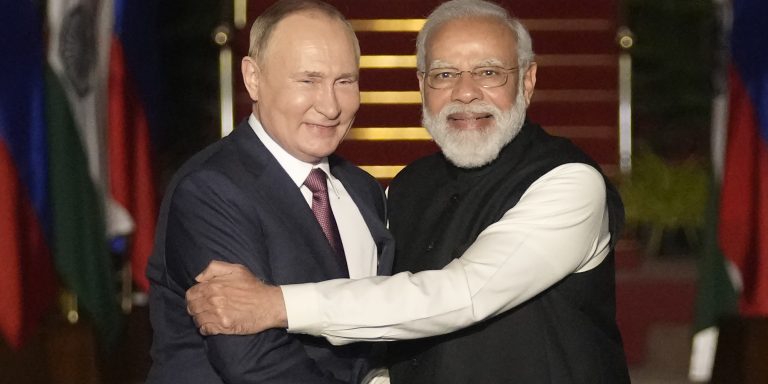INTELBRIEF
March 29, 2022
IntelBrief: India Preserves Relations with Russia after Ukraine Invasion

Bottom Line up Front
- India continues to maintain its supportive relationship with Russia despite international isolation of the Kremlin.
- Indian leaders continue to see Moscow as a counterweight to the threat posed by Beijing, a greater strategic concern for many in India.
- Russian weaponry will continue to help India meet its defense requirements.
- Increased Russian oil exports to New Delhi could help stabilize the global oil market, and their energy relationship could potentially prove diplomatically useful.
India continues to maintain its supportive relationship with Russia in the face of significant U.S and Western pressure to isolate the Kremlin following Russia’s invasion of Ukraine. India’s abstentions at the United Nations Security Council and General Assembly, despite considerable pressure by the U.S. and its allies in on Council members to support Ukraine, have highlighted the importance Indian leaders place on preserving the strong defense relationship with Russia. As an early leader of the Non-Aligned Movement, India’s traditional unwillingness to intervene in great power politics while preserving a focus on development opportunities, particularly for states emerging from colonial histories, renders its position unsurprising; nonetheless, its position challenges its support for the UN Charter and the norms of international law.
Indian officials have expressed deep concerns about compromising India’s interests and security, while focusing their support toward alleviating the humanitarian crisis in Ukraine. U.S. officials have signaled understanding of the challenges facing Indian leaders in developing a response. Over the past several years, New Delhi has been part of a broad Indo-Pacific alliance to contain Beijing, and Indian strategists have increasingly shifted their focus away from their historic rival, Pakistan, and toward China. India’s alarm about the potential threat from China has become particularly acute since the deadly armed clash between the two powers in the Himalayas in June 2020. India’s ability to help balance China—while at the same time addressing the ever-present threat from neighboring Pakistan and from an Afghanistan again under Taliban control—depends in large part on preserving a steady flow of arms from Russia. Long armed by the Soviet Union and, after its dissolution, by Russia, about 85% of India’s conventional military arsenal is of Russian origin. Indian pilots and other military personnel have trained and acquired combat experience with Russian equipment. Purchasing weaponry from Russia also enables India to avoid the lengthy sales process, strict end-user scrutiny, and oversight required with buying military equipment from U.S or European arms suppliers.
At the strategic level, Indian and U.S. leaders see India’s engagement with Moscow as helping reduceRussia’s economic and political dependence on Beijing. A key component of U.S. policy since Russia’s invasion of Ukraine has been to drive a wedge between Beijing and Moscow and thereby weaken the ability of either to upend the international order. Moreover, India has benefited economically from Russia’s isolation, and has increased its purchases of Russian oil; in mid-March, India agreed to buy 3 million barrels of oil from Russia. While this initial exchange is small, volumes are expected to grow significantly going forward. The purchase was set at a steep discount to world oil prices, and the two countries agreed that the buy would be paid for in Indian rupees and therefore not violate Western Ukraine-related sanctions on Russian banks. The reported terms of the oil deal illustrate the extent to which New Delhi, which is heavily dependent on imported oil, can benefit from helping a heavily-sanctioned Kremlin.
The oil deal with Moscow demonstrates the difficult balancing act New Delhi is attempting. The United States has banned U.S. importation of oil from Russia, and the United Kingdom and European Union countries have articulated plans to wean off imports of Russian oil, as well as natural gas. Many oil refiners have stopped buying any Russian oil to prevent risking their positions in Western markets. Indian officials point out that U.S.-led sanctions do not ban Russia’s exportation of oil, and that India’s purchases from Russia do not constitute a violation of any U.N. or multilateral sanction or policy. It can be argued that India’s purchases of oil from Russia may benefit the Western strategy by finding a home for otherwise unsold Russian oil and providing an incentive for Russia to continue producing at pre-invasion levels. India currently imports most of its oil from the Persian Gulf; increased Indian importation from Russia will free up additional Gulf oil to go to Europe and the United States. The Indian purchases from Russia could, therefore, help ease the post-invasion spike in world oil prices. Reflecting the intent of the United States to try to avoid punishing India for maintaining its relationships with Moscow, White House spokesperson Jen Psaki said on March 15 that India’s imports of Russian oil do not appear to violate any U.S. sanctions.
In many ways, an increase in India’s oil purchases from Russia represents not so much a departure but rather a continuation of a trend in the energy relationship of the two countries. In 2016, Russian oil major Rosneft and two partnering firms took a 49% stake respectively in an Indian refiner and petrochemicals firm, Nayara Energy, formerly Essar Oil Limited. The total $13 billion investment, of which about $8 billion came from Rosneft, was intended to help the energy firm expand its refining capacity and production of petrochemicals. In recent years, Indian energy firms have invested $16 billion in various energy fields in Siberia. It is possible, perhaps even likely, that Western sanctions on Russia for the Ukraine invasion will cause the termination of the mutual India and Russia energy investments. Still, the investments, as well as the stepped-up Indian oil purchases, demonstrate New Delhi’s willingness to work with Moscow and provide an important valve for diplomatic engagement that could support efforts to end the war in Ukraine.